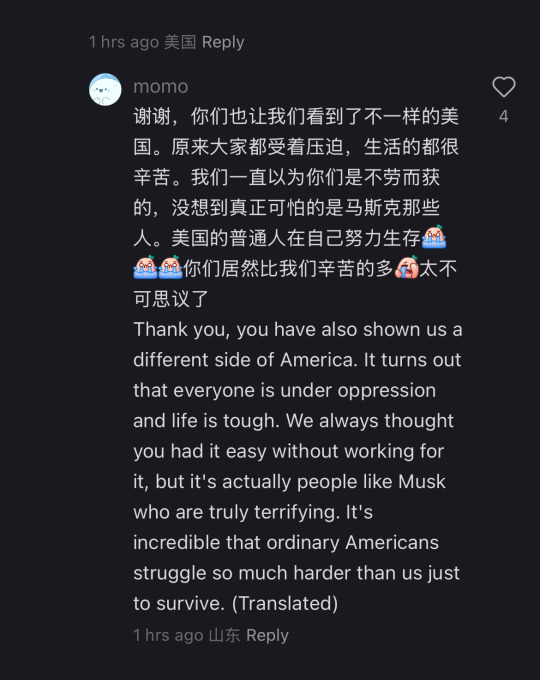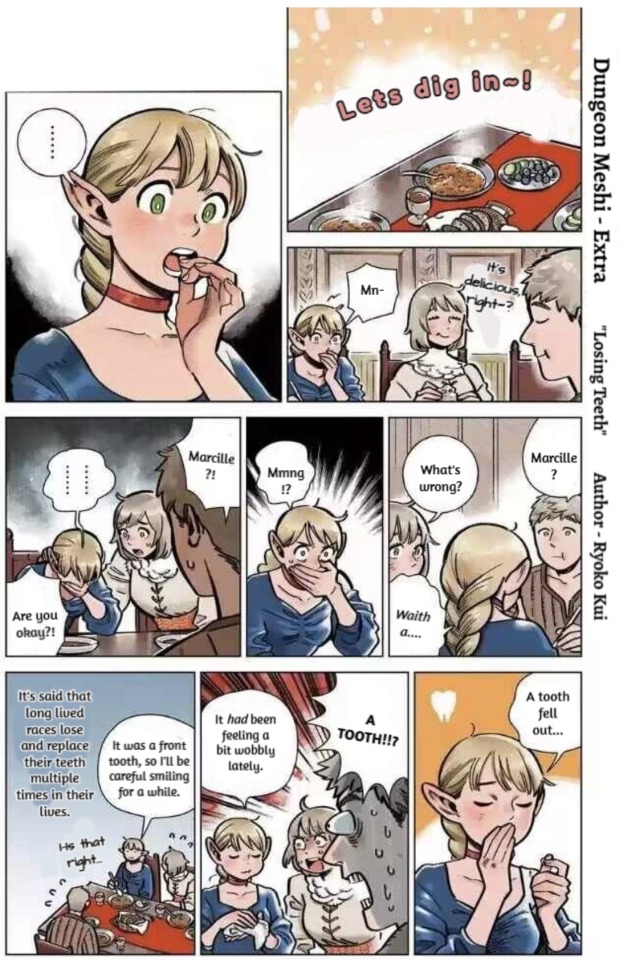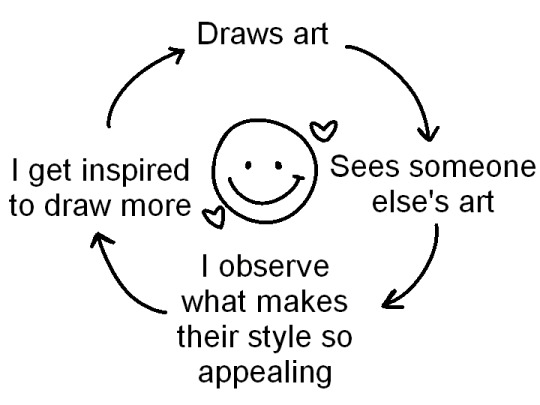#post: other
Explore tagged Tumblr posts
Text
Really interesting thing I glimpsed on rednote today




I think We- we’re developing international class consciousness 
#ryders rambles#LIKE idk man i think it’s really cool how we’re learning about each other Ill be back with the reverse once I found a post on it
60K notes
·
View notes
Text
shoutout to everyone who wants to infodump but cant string together coherent thoughts to form sentences and instead just look at you like this

#and by 'everyone' i mean me. im just hoping other people relate lmao#someone asks me about a thing i like and im just like h..................#been thinking about The Character for a solid 6 months+ and let me tell you. expldoeing soon#this is about ffxv btw . how am i supposed to say how much it lives in my brain . i cant think#text#1k#5k#10k#15k#20k#great googly moogly#30k#40k#50k#60k#boooy what da heeel#70k#80k#90k#will this be my first ever post to hit 100k... it remains to be seen#good lord. we did it#100k
136K notes
·
View notes
Text
HEY GUYS!!
GUYS!!!
FRANCE HAS REACHED THE REQUIRED NUMBER OF SIGNATURES ON THE CITIZEN'S INITIATIVE AGAINST CONVERSION THERAPY IN THE EU!!

ONE COUNTRY DOWN, SIX TO GO!!
We also need still quite a few signatures in order to reach the one million required.
As to date, the six other countries with the most signatures are:
Spain - 38.72%
Finland - 30.31%
Ireland - 24.86%
Netherlands - 24.15%
Germany - 23.54%
Belgium - 23.09%
So yeah, still a long way to go, but we ARE slowly getting closer. Don't stop now! Don't let this stay within the community, either, if you have any friends or family who are open to queer rights, get them to sign, too!
#good news#politics#EU politics#queer rights#human rights#lgbt rights#anti-conversion therapy#France#And I'll just tag the other countries mentioned in the post too#Spain#Finland#Ireland#Netherlands#Germany#Belgium
39K notes
·
View notes
Text
I hate how people will look at popular indie artists who had one or two songs go viral on TikTok and start making fun of anybody who listens to them. "Oh you listen to Lemon Demon, Will Wood, Jack Stauber, Glass Animals, and Mother Mother? Tsk, don't you know that is stupid TikTok neurodivergent white transmasc preteen music? It's so mid and bad you should listen to real music–" you are a pit of misery
#sp-rambles#Edit: Head in hands and groaning why did this post become about cringe culture and “not caring about what other people think”#Like yes of course cringe culture is dead yada yada but don't you guys think it's a little off how people use ableist and queerphobic#rhetoric still to describe things they do not like? Isn't that a bit more concerning?
154K notes
·
View notes
Text
justice for kabru. they put my man in the wrong genre. bro was meant to be playing psychological games with light yagami and instead he’s playing yaoi mind tennis with a blonde himbo
#kabru there’s no other option you need to kiss laios to gain the upper hand NOW!!!!!#labru#kabru#laios touden#dungeon meshi#dunmeshi#delicious in dungeon#i can’t stop posting about them i’m so sorry
67K notes
·
View notes
Text

https://nationalpost.com/news/canada/theyre-not-human-how-19th-century-inuit-coped-with-a-real-life-invasion-of-the-walking-dead
Indigenous groups across the Americas had all encountered Europeans differently. But where other coastal groups such as the Haida or the Mi’kmaq had met white men who were well-fed and well-dressed, the Inuit frequently encountered their future colonizers as small parties on the edge of death.
“I’m sure it terrified people,” said Eber, 91, speaking to the National Post by phone from her Toronto home.
And it’s why, as many as six generations after the events of the Franklin Expedition, Eber was meeting Inuit still raised on stories of the two giant ships that came to the Arctic and discharged columns of death onto the ice.
Inuit nomads had come across streams of men that “didn’t seem to be right.” Maddened by scurvy, botulism or desperation, they were raving in a language the Inuit couldn’t understand. In one case, hunters came across two Franklin Expedition survivors who had been sleeping for days in the hollowed-out corpses of seals.
“They were unrecognizable they were so dirty,” Lena Kingmiatook, a resident of Taloyoak, told Eber.
Mark Tootiak, a stepson of Nicholas Qayutinuaq, related a story to Eber of a group of Inuit who had an early encounter with a small and “hairy” group of Franklin Expedition men evacuating south.
“Later … these Inuit heard that people had seen more white people, a lot more white people, dying,” he said. “They were seen carrying human meat.”
Even Eber’s translator, the late Tommy Anguttitauruq, recounted a goose hunting trip in which he had stumbled upon a Franklin Expedition skeleton still carrying a clay pipe.
By 1850, coves and beaches around King William Island were littered with the disturbing remnants of their advance: Scraps of clothing and camps still littered with their dead occupants. Decades later, researchers would confirm the Inuit accounts of cannibalism when they found bleached human bones with their flesh hacked clean.
“I’ve never in all my life seen any kind of spirit — I’ve heard the sounds they make, but I’ve never seen them with my own eyes,” said the old man who had gone out to investigate the Franklin survivors who had straggled into his camp that day on King William Island.
The figures’ skin was cold but it was not “cold as a fish,” concluded the man. Therefore, he reasoned, they were probably alive.
“They were beings but not Inuit,” he said, according to the account by shaman Nicholas Qayutinuaq.
The figures were too weak to be dangerous, so Inuit women tried to comfort the strangers by inviting them into their igloo.
But close contact only increased their alienness: The men were timid, untalkative and — despite their obvious starvation — they refused to eat.
The men spit out pieces of cooked seal offered to them. They rejected offers of soup. They grabbed jealous hold of their belongings when the Inuit offered to trade.
When the Inuit men returned to the camp from their hunt, they constructed an igloo for the strangers, built them a fire and even outfitted the shelter with three whole seals.
Then, after the white men had gone to sleep, the Inuit quickly packed up their belongings and fled by moonlight.
Whether the pale-skinned visitors were qallunaat or “Indians” — the group determined that staying too long around these “strange people” with iron knives could get them all killed.
“That night they got all their belongings together and took off towards the southwest,” Qayutinuaq told Dorothy Eber.
But the true horror of the encounter wouldn’t be revealed until several months later.
The Inuit had left in such a hurry that they had abandoned several belongings. When a small party went back to the camp to retrieve them, they found an igloo filled with corpses.
The seals were untouched. Instead, the men had eaten each other.
#being so English you die of racism#because youd rather eat each other than a seal#or try to signal to the friendly locals that you need help#many such cases#UNIRONICALLY#the terror#the franklin expedition#dorothy eber#then they infected all these people with European disease of course#the national post is a chud rag so this is an unexpectedly good article for them
59K notes
·
View notes
Text

I can't unsee this
#arcane#jayvik#someone screenshoted it from my twitter and stole it to post it on their own blog so you prob have seen it already#if you're kind enough to give this a reblog anyway thar would help me greatly ! thank you !#jayce talis#viktor#anyway i have like 20 other arcane fanarts in stock that i have to post follow me
26K notes
·
View notes
Text

The new Marcille extra by Ryoko Kui
#guys the Marcille losing a tooth extra is finally online#marcille donato#falin touden#laios touden#dungeon meshi#dungeon meshi spoilers#look at farcille sitting next to each other i love them#r posts#teeth
23K notes
·
View notes
Text

Peace and love
#pink posts#i saw a tweet that was like “i see other people's art” --> i get discouraged#i understand that seeing art that is prettier than yours can be discouraging but why not twist that a bit?#why does it look prettier to you? is it the colors#is it the textures they used? the brushes?#study them and try to put your spin on it#and maybe you'll find your art beautiful as well
94K notes
·
View notes
Text
There seems to be a general malaise on most of Tumblr about TikTok getting banned in the United States.
I understand the problems, "brain rot", whatever but- A government banning a social media app that opened the world for many people is legitimately scary and upsetting. Say what you want but, there are MANY global and local issues that would not have gotten the same traction, recognition, and outreach without TikTok.
And then add to this that Meta/Facebook was one the largest lobbyists working to get TikTok banned... Like- I think folks should be more concerned about the implications of what this means, especially since the ban goes into effect the day before inauguration.
#Its more than “a silly dance app”#Gave Americans and others a first hand look into international issues such as Palestine and Ukraine#TikTok was a HUGE part of the BLM movement in 2020#luigi mangione#We saw things happen in real time we wouldn't have known as much about without everyday TikTok users posting and reporting on things#Further censorship like this is REALLY scary#If they can get rid of TikTok for the reasons theyre trying what happens next#tiktok#tiktok ban#2025#I know what I'm saying isn't perfect but just I'm worried and upset
15K notes
·
View notes
Text
Planet fitness is offering free showers, wifi, and charging stations to first responders and residents in the LA area who've been affected by the fires btw.
#angel posts#planet fitness#la#fire#los angeles#los angeles fire#idk what other tags to use please reblog
14K notes
·
View notes
Text
What's everyone's favourite flowers that aren't like. The normal ones. Like everyone's a fan of roses and sunflowers what's a more niche one. One you don't get in gift sets. Mine's sweet peas
#other good ones are crocuses and lilacs#one time I was ill and depressed and my mum brought me a lil milk bottle full of fresh cut sweet peas from her garden 💖#i like that theyre colourful and i like climbing plants and they smell amazing#posts brought to you by me going to the park on my lunch break just to see all the crocuses
59K notes
·
View notes
Text
Planet's Fucked: What Can You Do To Help? (Long Post)
Since nobody is talking about the existential threat to the climate and the environment a second Trump term/Republican government control will cause, which to me supersedes literally every other issue, I wanted to just say my two cents, and some things you can do to help. I am a conservation biologist, whose field was hit substantially by the first Trump presidency. I study wild bees, birds, and plants.
In case anyone forgot what he did last time, he gagged scientists' ability to talk about climate change, he tried zeroing budgets for agencies like the NOAA, he attempted to gut protections in the Endangered Species Act (mainly by redefining 'take' in a way that would allow corporations to destroy habitat of imperiled species with no ramifications), he tried to do the same for the Migratory Bird Treaty Act (the law that offers official protection for native non-game birds), he sought to expand oil and coal extraction from federal protected lands, he shrunk the size of multiple national preserves, HE PULLED US OUT OF THE PARIS CLIMATE AGREEMENT, and more.
We are at a crucial tipping point in being able to slow the pace of climate change, where we decide what emissions scenario we will operate at, with existential consequences for both the environment and people. We are also in the middle of the Sixth Mass Extinction, with the rate of species extinctions far surpassing background rates due completely to human actions. What we do now will determine the fate of the environment for hundreds or thousands of years - from our ability to grow key food crops (goodbye corn belt! I hated you anyway but), to the pressure on coastal communities that will face the brunt of sea level rise and intensifying extreme weather events, to desertification, ocean acidification, wildfires, melting permafrost (yay, outbreaks of deadly frozen viruses!), and a breaking down of ecosystems and ecosystem services due to continued habitat loss and species declines, especially insect declines. The fact that the environment is clearly a low priority issue despite the very real existential threat to so many people, is beyond my ability to understand. I do partly blame the public education system for offering no mandatory environmental science curriculum or any at all in most places. What it means is that it will take the support of everyone who does care to make any amount of difference in this steeply uphill battle.
There are not enough environmental scientists to solve these issues, not if public support is not on our side and the majority of the general public is either uninformed or actively hostile towards climate science (or any conservation science).
So what can you, my fellow Americans, do to help mitigate and minimize the inevitable damage that lay ahead?
I'm not going to tell you to recycle more or take shorter showers. I'll be honest, that stuff is a drop in the bucket. What does matter on the individual level is restoring and protecting habitat, reducing threats to at-risk species, reducing pesticide use, improving agricultural practices, and pushing for policy changes. Restoring CONNECTIVITY to our landscape - corridors of contiguous habitat - will make all the difference for wildlife to be able to survive a changing climate and continued human population expansion.
**Caveat that I work in the northeast with pollinators and birds so I cannot provide specific organizations for some topics, including climate change focused NGOs. Scientists on tumblr who specialize in other fields, please add your own recommended resources. **
We need two things: FUNDING and MANPOWER.
You may surprised to find that an insane amount of conservation work is carried out by volunteers. We don't ever have the funds to pay most of the people who want to help. If you really really care, consider going into a conservation-related field as a career. It's rewarding, passionate work.
At the national level, please support:
The Nature Conservancy
Xerces Society for Invertebrate Conservation
Cornell Lab of Ornithology (including eBird)
National Audubon Society
Federal Duck Stamps (you don't need to be a hunter to buy one!)
These first four work to acquire and restore critical habitat, change environmental policy, and educate the public. There is almost certainly a Nature Conservancy-owned property within driving distance of you. Xerces plays a very large role in pollinator conservation, including sustainable agriculture, native bee monitoring programs, and the Bee City/Bee Campus USA programs. The Lab of O is one of the world's leaders in bird research and conservation. Audubon focuses on bird conservation. You can get annual memberships to these organizations and receive cool swag and/or a subscription to their publications which are well worth it. You can also volunteer your time; we need thousands of volunteers to do everything from conducting wildlife surveys, invasive species removal, providing outreach programming, managing habitat/clearing trails, planting trees, you name it. Federal Duck Stamps are the major revenue for wetland conservation; hunters need to buy them to hunt waterfowl but anyone can get them to collect!
THERE ARE DEFINITELY MORE, but these are a start.
Additionally, any federal or local organizations that seek to provide support and relief to those affected by hurricanes, sea level rise, any form of coastal climate change...
At the regional level:
These are a list of topics that affect major regions of the United States. Since I do not work in most of these areas I don't feel confident recommending specific organizations, but please seek resources relating to these as they are likely major conservation issues near you.
PRAIRIE CONSERVATION & PRAIRIE POTHOLE WETLANDS
DRYING OF THE COLORADO RIVER (good overview video linked)
PROTECTION OF ESTUARIES AND SALTMARSH, ESPECIALLY IN THE DELAWARE BAY AND LONG ISLAND (and mangroves further south, everglades etc; this includes restoring LIVING SHORELINES instead of concrete storm walls; also check out the likely-soon extinction of saltmarsh sparrows)
UNDAMMING MAJOR RIVERS (not just the Colorado; restoring salmon runs, restoring historic floodplains)
NATIVE POLLINATOR DECLINES (NOT honeybees. for fuck's sake. honeybees are non-native domesticated animals. don't you DARE get honeybee hives to 'save the bees')
WILDLIFE ALONG THE SOUTHERN BORDER (support the Mission Butterfly Center!)
INVASIVE PLANT AND ANIMAL SPECIES (this is everywhere but the specifics will differ regionally, dear lord please help Hawaii)
LOSS OF WETLANDS NATIONWIDE (some states have lost over 90% of their wetlands, I'm looking at you California, Ohio, Illinois)
INDUSTRIAL AGRICULTURE, esp in the CORN BELT and CALIFORNIA - this is an issue much bigger than each of us, but we can work incrementally to promote sustainable practices and create habitat in farmland-dominated areas. Support small, local farms, especially those that use soil regenerative practices, no-till agriculture, no pesticides/Integrated Pest Management/no neonicotinoids/at least non-persistent pesticides. We need more farmers enrolling in NRCS programs to put farmland in temporary or permanent wetland easements, or to rent the land for a 30-year solar farm cycle. We've lost over 99% of our prairies to corn and soybeans. Let's not make it 100%.
INDIGENOUS LAND-BACK EFFORTS/INDIGENOUS LAND MANAGEMENT/TEK (adding this because there have been increasing efforts not just for reparations but to also allow indigenous communities to steward and manage lands either fully independently or alongside western science, and it would have great benefits for both people and the land; I know others on here could speak much more on this. Please platform indigenous voices)
HARMFUL ALGAL BLOOMS (get your neighbors to stop dumping fertilizers on their lawn next to lakes, reduce agricultural runoff)
OCEAN PLASTIC (it's not straws, it's mostly commercial fishing line/trawling equipment and microplastics)
A lot of these are interconnected. And of course not a complete list.
At the state and local level:
You probably have the most power to make change at the local level!
Support or volunteer at your local nature centers, local/state land conservancy non-profits (find out who owns&manages the preserves you like to hike at!), state fish & game dept/non-game program, local Audubon chapters (they do a LOT). Participate in a Christmas Bird Count!
Join local garden clubs, which install and maintain town plantings - encourage them to use NATIVE plants. Join a community garden!
Get your college campus or city/town certified in the Bee Campus USA/Bee City USA programs from the Xerces Society
Check out your state's official plant nursery, forest society, natural heritage program, anything that you could become a member of, get plants from, or volunteer at.
Volunteer to be part of your town's conservation commission, which makes decisions about land management and funding
Attend classes or volunteer with your land grant university's cooperative extension (including master gardener programs)
Literally any volunteer effort aimed at improving the local environment, whether that's picking up litter, pulling invasive plants, installing a local garden, planting trees in a city park, ANYTHING. make a positive change in your own sphere. learn the local issues affecting your nearby ecosystems. I guarantee some lake or river nearby is polluted
MAKE HABITAT IN YOUR COMMUNITY. Biggest thing you can do. Use plants native to your area in your yard or garden. Ditch your lawn. Don't use pesticides (including mosquito spraying, tick spraying, Roundup, etc). Don't use fertilizers that will run off into drinking water. Leave the leaves in your yard. Get your school/college to plant native gardens. Plant native trees (most trees planted in yards are not native). Remove invasive plants in your yard.
On this last point, HERE ARE EASY ONLINE RESOURCES TO FIND NATIVE PLANTS and LEARN ABOUT NATIVE GARDENING:
Xerces Society Pollinator Conservation Resource Center
Pollinator Pathway
Audubon Native Plant Finder
Homegrown National Park (and Doug Tallamy's other books)
National Wildlife Federation Native Plant Finder (clunky but somewhat helpful)
Heather Holm (for prairie/midwest/northeast)
MonarchGard w/ Benjamin Vogt (for prairie/midwest)
Native Plant Trust (northeast & mid-atlantic)
Grow Native Massachusetts (northeast)
Habitat Gardening in Central New York (northeast)
There are many more - I'm not familiar with resources for western states. Print books are your biggest friend. Happy to provide a list of those.
Lastly, you can help scientists monitor species using citizen science. Contribute to iNaturalist, eBird, Bumblebee Watch, or any number of more geographically or taxonomically targeted programs (for instance, our state has a butterfly census carried out by citizen volunteers).
In short? Get curious, get educated, get involved. Notice your local nature, find out how it's threatened, and find out who's working to protect it that you can help with. The health of the planet, including our resilience to climate change, is determined by small local efforts to maintain and restore habitat. That is how we survive this. When government funding won't come, when we're beat back at every turn trying to get policy changed, it comes down to each individual person creating a safe refuge for nature.
Thanks for reading this far. Please feel free to add your own credible resources and organizations.
#us election#climate change#united states election#resources#native plants#this took 3 hours to write so maybe don't let it flop? i know i write long posts. i know i follow scientists on here#that study birds and corals and other creatures#i realize i did not link sources/resources for everything. i encourage those more qualified to add things on. i need to go to work
18K notes
·
View notes
Text
The movie Wicked is proof that any source material can be vastly improved by simply making the intense female friendship much gayer + the mutual male love interest both wildly bisexual and lowkey down to just be their third
#i can’t believe they improved Fiyero’s character so much just by making him intensely into both women at the same time asdakdga#Elphaba: *screaming at people*#Glinda: yeah baby you tell em! my girlfriend is gonna kick your ass!#Fiyero: god I’m so fucking turned on right now why am I so turned on by this#ideal dynamic tbh#i have other much more meaningful thoughts on this movie but this was so funny I had to post it#It was a very very good movie ngl#wicked#wicked movie
18K notes
·
View notes
Text
It's honestly crazy that discussion around testosterone HRT skews so much towards the beginning stages of it (to the point that you have dozens of guys thinking their transition is "failed" if they don't pass by like a year in lol) and what the initial changes of the first couple of months to years look like, like the classic laundry list of those early basic changes like bottom growth, voice drop, etc, when IMO literally none of that compares remotely to the depth and intensity of the long term total masculinization you start to experience like 3-5+ years in.
#also has made it increasingly difficult to relate to those early into their transition honestly#like not in a bitter way it’s just like hard to express how diff the experience is#of being like a year on T vs 5 😭#ETA I muted this post ages ago now but fwiw seeing transphobes pop up in the notes on occasion just to say cruel reactionary shit#you are clowns I cannot imagine seeing a post that is ONLY about discussing with folks about the reality of a medication#and choosing to make that your moment to get a schoolyard bully jab in about how you find it gross or something.#you are less well adjusted than most children. may the universe be kinder to you than you are to others.
50K notes
·
View notes